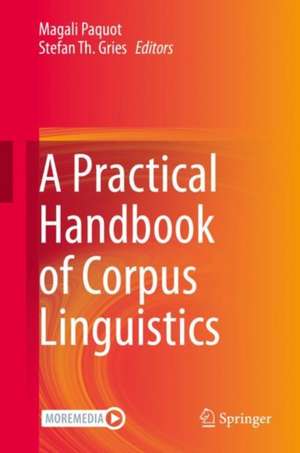A Practical Handbook of Corpus Linguistics
Editat de Magali Paquot, Stefan Th. Griesen Limba Engleză Hardback – 5 mai 2021
| Toate formatele și edițiile | Preț | Express |
|---|---|---|
| Paperback (1) | 660.04 lei 6-8 săpt. | |
| Springer International Publishing – 5 mai 2022 | 660.04 lei 6-8 săpt. | |
| Hardback (1) | 613.45 lei 38-44 zile | |
| Springer International Publishing – 5 mai 2021 | 613.45 lei 38-44 zile |
Preț: 613.45 lei
Preț vechi: 766.82 lei
-20% Nou
Puncte Express: 920
Preț estimativ în valută:
117.39€ • 121.87$ • 97.89£
117.39€ • 121.87$ • 97.89£
Carte tipărită la comandă
Livrare economică 18-24 martie
Preluare comenzi: 021 569.72.76
Specificații
ISBN-13: 9783030462154
ISBN-10: 3030462153
Pagini: 652
Ilustrații: XI, 686 p. 206 illus., 46 illus. in color.
Dimensiuni: 155 x 235 x 39 mm
Greutate: 1.27 kg
Ediția:1st ed. 2020
Editura: Springer International Publishing
Colecția Springer
Locul publicării:Cham, Switzerland
ISBN-10: 3030462153
Pagini: 652
Ilustrații: XI, 686 p. 206 illus., 46 illus. in color.
Dimensiuni: 155 x 235 x 39 mm
Greutate: 1.27 kg
Ediția:1st ed. 2020
Editura: Springer International Publishing
Colecția Springer
Locul publicării:Cham, Switzerland
Cuprins
Introduction.- Part I: Corpus design, corpus methods and corpus types.- Chapter 1. Corpus Compilation (Annelie Adel).- Chapter 2. Corpus Annotation (John Newman & Christopher Cox).- Chapter 3. Corpus Architecture (Amir Zeldes).- Chapter 4. Analyzing frequency lists (Don Miller).- Chapter 5. Analyzing dispersion (Stefan Th. Gries).- Chapter 6. Analyzing keyword lists (Paul Rayson & Amanda Potts).- Chapter 7. Analyzing co-occurrence data (Stefan Th. Gries & Phil Durrant).- Chapter 8. Analyzing concordances (Steffi Wulff & Paul Baker).- Chapter 9. Programming for corpus linguistics (Laurence Anthony).- Chapter 10. Diachronic corpora (Kristine Davidse & Henrik de Smet).- Chapter 11. Spoken corpora (Ulrike Gut).- Chapter 12. Parallel corpora (Marie-Aude Lefer).- Chapter 13. Learner corpora (Gaëtanelle Gilquin).- Chapter 14. Child-language corpora (Sabine Stoll & Robert Schikowski).- Chapter 15. Web corpora (Andrew Kehoe).- Chapter 16. Multimodal corpora (Dawn Knight & Svenja Adolphs).- Part II: Quantitative analyses of corpora with R.- Chapter 17. Descriptive statistics and visualization with R (Magali Paquot & Tove Larsson).- Chapter 18. Cluster analysis (Hermann Moisl).- Chapter 19. Multidimensional exploratory approaches (Guillaume Desagulier).- Chapter 20. Classical monofactorial (parametric and non-parametric) tests (Vaclav Brezina).- Chapter 21. Fixed-effects regression modeling (Martin Hilpert & Damian Blasi).- Chapter 22. Mixed-effects regression modeling (Roland Schäfer).- Chapter 23. Generalized additive mixed models (R. Harald Baayen & Maja Linke).- Chapter 24. Bootstrapping techniques (Jesse Egbert & Luke Plonsky).- Chapter 25. Conditional inference trees and random forests (Natalia Levshina).- Part III: Pulling everything together.- Chapter 26. Writing up a corpus linguistic paper (Stefan Th. Gries & Magali Paquot).- Chapter 27. Meta-analyzing corpus linguistic research (Atsushi Mizumoto, Luke Plonsky & Jesse Egbert).- Index.
Recenzii
“It has been a true pleasure to read, especially thanks to its clear and very thoughtfully planned structure and carefully selected representative studies. Very well-edited and well-organised in its comprehensiveness, this handbook constitutes an invaluable resource both for corpus linguists and other researchers who are starting to familiarise themselves with corpora.” (Leida Maria Monaco, Corpus Pragmatics, Vol. 6, 2022)
Notă biografică
Magali Paquot is a permanent FNRS research associate at the Centre for English Corpus Linguistics, UCLouvain. She is co‐editor in chief of the International Journal of Learner Corpus Research and a founding member of the Learner Corpus Research Association.
Stefan Th. Gries is Professor in the Department of Linguistics at the University of California, Santa Barbara (UCSB) and Chair of English Linguistics (Corpus Linguistics with a focus on quantitative methods) at the Justus‐Liebig‐Universität Giessen (25%). He was a Visiting Chair of the Centre for Corpus Approaches to Social Science at Lancaster University for 5 years, held the Honorary Leibniz Professorship at the University of Leipzig, and was a Visiting Professor at multiple LSA Summer Institutes.
Textul de pe ultima copertă
This handbook is a comprehensive practical resource on corpus linguistics. It features a range of basic and advanced approaches, methods and techniques in corpus linguistics, from corpus compilation principles to quantitative data analyses. The Handbook is organized in six Parts. Parts I to III feature chapters that discuss key issues and the know-how related to various topics around corpus design, methods and corpus types. Parts IV-V aim to offer a user-friendly introduction to the quantitative analysis of corpus data: for each statistical technique discussed, chapters provide a practical guide with R and come with supplementary online material. Part VI focuses on how to write a corpus linguistic paper and how to meta-analyze corpus linguistic research. The volume can serve as a course book as well as for individual study. It will be an essential reading for students of corpus linguistics as well as experienced researchers who want to expand their knowledge of the field.
Caracteristici
Covers all relevant aspects of corpus linguistics in chapters that are structured for cohesion and reader accessibility Includes a practical and user-friendly introduction to advanced statistics with R Offers chapters on topics ranging from corpus design, method and analyses to reporting results for publication
